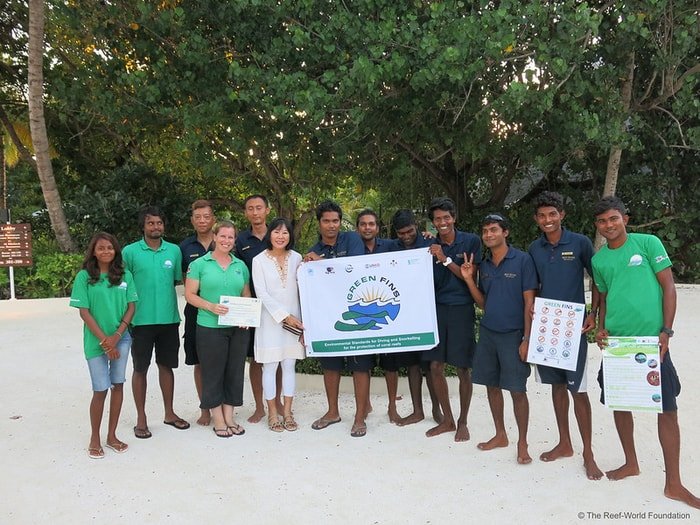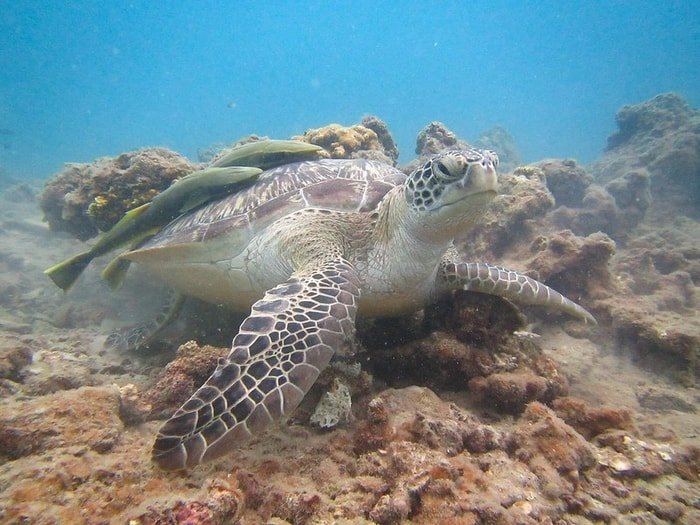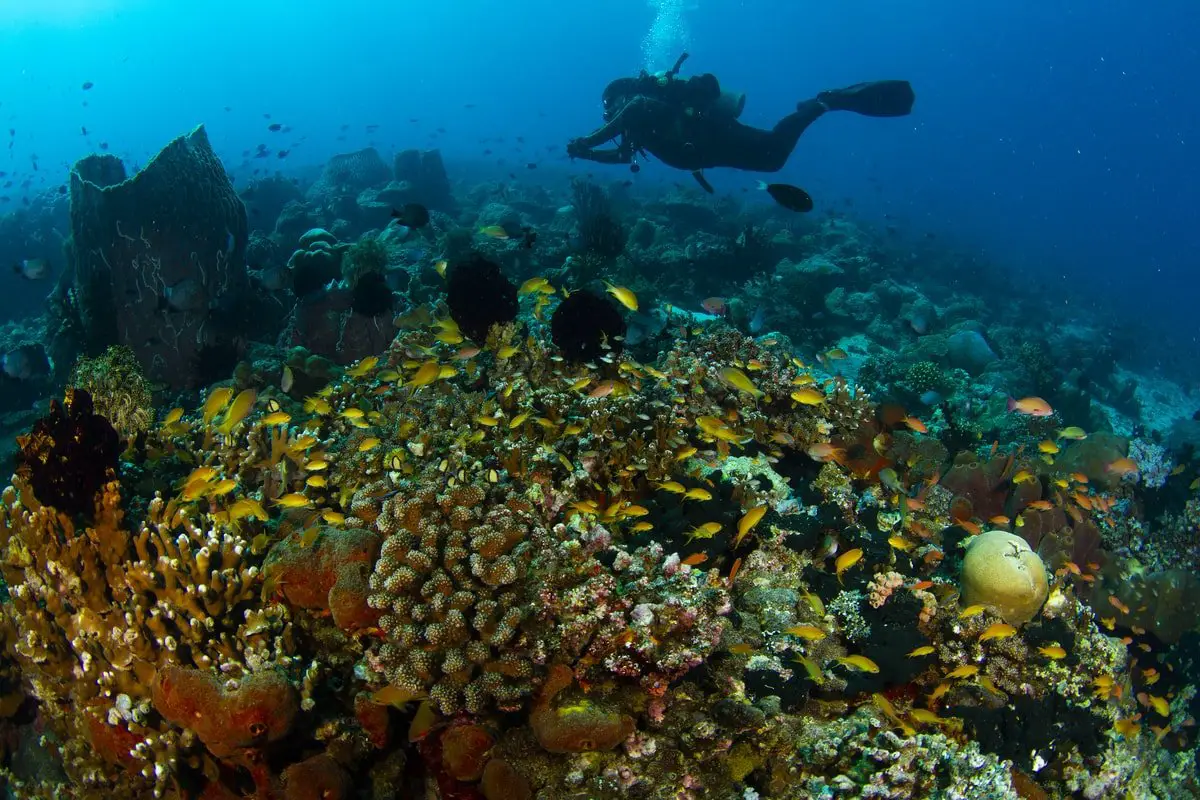Last Updated on October 19, 2024
Have you ever seen a healthy coral reef, buzzing with life? Coral reefs are the building blocks for the entire ocean ecosystem. Taking up less than 1% of the ocean, coral reefs are home to more than a quarter of all marine life. Without healthy coral reefs, the ocean would lose a huge amount of diversity. So, even if you’ve only seen these marvelous ecosystems on TV, it’s vitally important that each of us take steps to protect them.
While irresponsible tourism can add to the threats corals face, well-managed and sustainable tourism provides many benefits including creating economic opportunities to support local communities. Anyone who visits the ocean can have a positive or negative impact on its fragile marine ecosystems. You don’t need to be a diver or snorkeler to make small changes to your behavior that will protect the ocean. So, here are a few actions we can all take to reduce the pressures tourism puts on coral reefs and protect them for future generations.
Table of Contents
Actions You Can Take To Protect Coral Reefs
Before you depart
Do your research
The impact you have through your vacation starts before you’ve even left the house. So, proper planning is really important. Research sustainable lodging options and find outdoor activities such as snorkeling or diving.
Pack smart
You can have the best intentions in the world but, particularly in remote locations, it can be hard to access some more sustainable items. For example, some destinations still use single-use plastic bags as the norm and it can be challenging to find reusable alternatives. To make sure you don’t get caught short, it’s worth packing a few key items to bring with you: a reusable shopping bag, refillable water bottle, bamboo cutlery, and a Keep Cup are all likely to come in handy.
Book with a Green Fins member
Green Fins is an initiative that protects and conserves coral reefs through environmental guidelines that promote a sustainable diving and snorkeling industry. Green Fins dive operators have committed to taking proactive steps to reduce their negative environmental impact. So, by choosing a Green Fins member, you’re showing your support for operators who value sustainability.

Above the water
Don’t litter
It should go without saying never to throw trash, minimize your use of single-use items, recycle and dispose of your litter properly. Trash in the ocean can injure and even kill marine life.
Take part in cleanup events
If you see litter during a walk along the beach or on a snorkeling trip, play your part by picking it up and disposing of it properly. To go a step further, find out if any beach cleanups are taking place during your trip and volunteer to help out! Not only will you be helping to protect the ocean from harmful marine debris but it’s a great way to meet people and make friends.
Ask for your drink without a straw
If you’re reading this, you probably already avoid plastic straws. But, remember, while you’re traveling you might be in a location where it’s still common to serve plastic straws with your drink. To prevent this, try to get into the habit of asking “no straw please” when ordering any drinks – bonus points if you can learn the phrase in the local language at your destination!
Don’t buy souvenirs made of shell, coral, or other marine life
When you’re looking for a souvenir to remind you of your trip, you’ll probably have the choice of picking up some pretty shell jewelry or coral decorations. Removing marine life from the ocean for sale has a negative impact on the ecosystems that rely on them. Please avoid these items and choose another souvenir.
Learn more about the Effects of Ocean Dumping- Microplastics in Seafood
Below the water
Don’t step on coral
Coral might sometimes look like rock but it’s actually a fragile animal. Divers and snorkelers can easily break coral by knocking it with their feet, fins, or equipment and this damage can be incredibly harmful to reefs.
Don’t touch or chase marine life
It’s so exciting to see a turtle, ray, or other marine animals in its natural habitat. But please resist the temptation to touch or chase after them: this can scare and stress the animal and often means they’ll swim away and ruin your encounter.

Don’t take marine life – dead or alive
Please never remove any species from the ocean: they normally break down and be recycled into the sea so taking them leaves other animals without nutrients and elements they need for growth. Even empty shells on the beach play an important role in the wider ecosystem. Take nothing but pictures, leave nothing but bubbles.
Don’t feed the fish
This can make fish sick or aggressive as well as making them more likely to leave their nests empty and vulnerable to predators. Please don’t throw food in the water to try to attract fish – and avoid throwing food scraps overboard if you’ve had your lunch on a boat as this can have the same effect.
Wear reef-safe sunscreen
Try to choose reef-safe sunscreen products (you might need to pick these up before you leave home as they can be difficult to find in remote locations). This is because some chemical components in sunscreen – including Oxybenzone and Octinoxate – may have a negative impact on coral reefs and so should be avoided.
When you get home
Make a start
You don’t need to be beside the ocean to take actions that protect the ocean. So, here are a few small changes you can make in your day to day life which will have a positive impact on our ocean. There’s no better time to start than today!
Remember the five Rs
Try to remember and follow the five Rs to reduce your waste whenever you can: refuse, reduce, reuse, repurpose, and recycle.
Learn more about 5 Ways You Can Reduce Plastic Footprint At Home
Make some simple swaps
For example, changing from plastic to bamboo or wooden toothbrushes, trying plastic-free floss, and switching to shampoo bars from plastic bottles. There are even lots of plastic-free toilet paper companies on the market now too.
Tell others how they can help
Making changes yourself is fantastic but we all need to work together to create a wave of positive impact. Tell your friends and family what they can do to act as responsible tourists. Together, we can protect coral reefs and our ocean for years to come.
About The Author

Melissa is a freelance travel writer and Communications Manager at The Reef-World Foundation; the charity which coordinates the Green Fins initiative in partnership with the UN Environment Programme. A qualified scuba diver, she’s particularly passionate about marine conservation and eco-travel initiatives.

Barbara is an environmental activist and sustainability advocate who loves living green and sustainable. She firmly believes in reducing her carbon footprint and has been making great strides towards achieving this goal. Barbara is a vegan and avid recycler and has been actively involved in community gardens and other green initiatives. She is passionate about spreading awareness about the importance of living in a sustainable and eco-friendly manner. Barbara is always looking for ways to make a difference in her community and beyond. She is a huge advocate for preserving nature and the planet for future generations.

